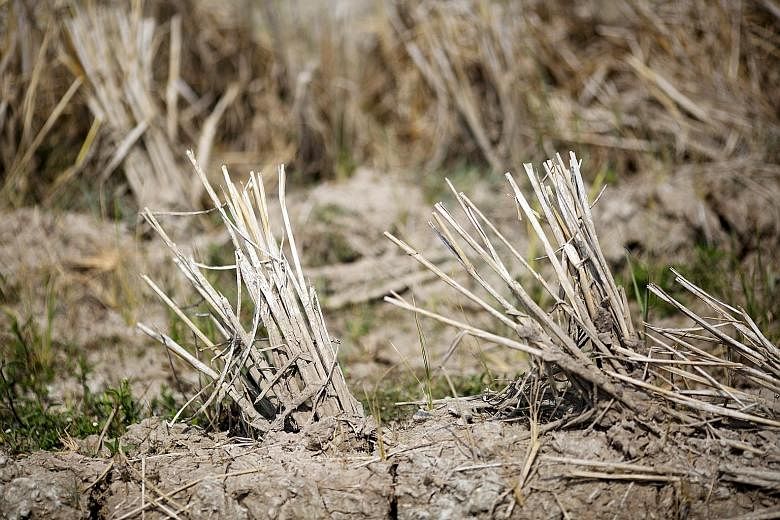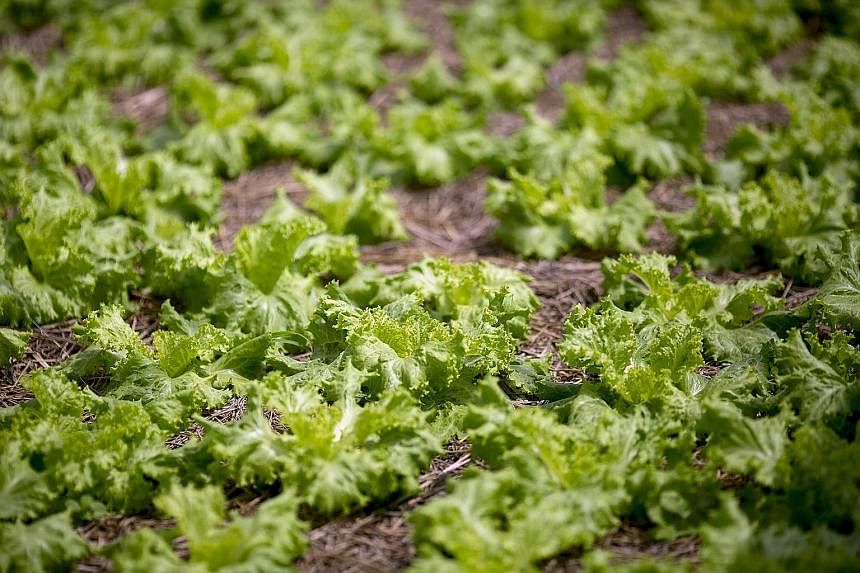BANGKOK • Rice farmer Prapatpon Rungsatien perches on a plastic chair in a classroom in rural Thailand. Ceiling fans stir the humid air as she and 49 of her neighbours listen to a talk on South-east Asian economics.
Ms Prapatpon, 48, returned to school last month for a state-funded training programme designed to wean farmers off water-intensive rice and teach them how to grow other crops.
With lessons spanning everything from accounting to chicken husbandry, the government is trying to reduce a record stockpile of the grain at a time when farmers are facing the worst drought in two decades. The government in Thailand, typically the world's largest rice exporter, has advised farmers on producing alternatives to the crop for a decade. Now, in the face of diminishing water and plunging prices, it is getting more serious.
A banner at the front of the classroom in a village in Sangkaburi district, Chai Nat province, bears the ruling junta's logo.
An adjacent sign featuring King Bhumibol Adulyadej's image says: "Use Water Wisely".
Outside, an irrigation canal opposite the building is bone dry, like the surrounding farmland.
"With the problem of drought, these people are going to suffer," Finance Minister Apisak Tantivorawong said in an interview in Bangkok on Tuesday.
"What we are trying to do is to inject some money into this sector - try to help them, try to employ them - teaching them how to survive in this difficult period."
The El Nino-induced drought will drain about 84 billion baht (S$3.3 billion) from the economy and sap demand for durable goods such as vehicles, electrical appliances and farm machinery, TMB Bank said in a Feb 19 report.
Agriculture accounts for 8 per cent of Thai GDP, Mr Apisak said.
Farm output has contracted by 7 per cent to 8 per cent in each of the past two years and farmers' debt to agricultural income is hovering around 100 per cent, said Dr Santitarn Sathirathai, an economist with Credit Suisse Group in Singapore.
"I thought about growing green beans, but there's not even enough water for that," Ms Prapatpon said. "My land is dry and cracked. How can I grow anything? I can't even get water from the ground."
Her struggle exemplifies the difficulty finding viable solutions to drought, even after the military government approved 11.2 billion baht of measures last year to help farmers, including encouraging them to plant crops that need less water and giving them more time to repay loans.
Rice, a staple entrenched in Thai culture, is being targeted because flood-irrigated padi uses a lot of water - sometimes 21/2 times the amount needed to grow a crop of wheat or maize.
With water levels at the Bhumibol and Sirikit dams - the main water sources for the country's central plain - at their lowest since 1994, the government wants to reduce the country's rice production to 27 million tonnes in the planting season starting in May, a quarter less than the five-year average.
For more than a decade, Thai rice farmers were cushioned by subsidies. The support won rural votes for former prime ministers Thaksin Shinawatra and his sister, Ms Yingluck Shinawatra.
It also led to a 20 per cent jump in rice production and a record 17.8 million tonne stockpile that the current government is struggling to sell.
Rice farmers have played a central role in Thailand's last decade of political unrest, turning out en mass to support the Shinawatra family, whose allied governments have been twice ousted in coups despite winning every national election since 2001.
Junta leader and now Prime Minister Prayut Chan-o-cha has taken to the airwaves repeatedly to urge farmers to plant less rice.
For farmer-turned-student Chaiyapoj Phak-on, the past two years have been a harsh contrast to the heady days of the previous government's income-propping rice-buying programme, which he called "the best time of my life".
While he would still prefer to grow rice, the 50-year-old said the government's training has offered him encouragement. "There are other ways to make a living," he said. "There is hope."
BLOOMBERG


